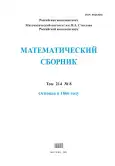Vol 214, No 8 (2023)
Existence of polynomial solutions of the Monge-Ampère equation of the 4th degree. Strong bending of a thin plate
Abstract
We provide necessary and sufficient conditions for the solvability of a simplest Monge-Ampère equation, assuming that both the right-hand side and the solution are polynomials of degree 4. We give a constructive method of solution of the basic system of algebraic equations corresponding to the Monge-Ampère operator under the above conditions on the prescribed polynomial. Applications to large deflections of thin plates are presented.
 3-17
3-17


On the solvability of the Nevanlinna-Pik interpolation problem
Abstract
A solvability theorem is proved for the Nevanlinna-Pick interpolation problem. Its extreme cases are Carathéodory's and Sсhur's criteria on the one hand (when all interpolation points coincide) and the Krein-Rekhtman theorem on the other (when the interpolation points are pairwise distinct).
 18-52
18-52


Symmetric matrices and maximal Nijenhuis pencils
Abstract
A Nijenhuis pencil is a linear subspace of the space of
 53-62
53-62


Explicit deformation of the horospherical variety of type $G_2$
Abstract
We give two simple geometric constructions of a smooth family of projective varieties with central fiber isomorphic to the horospherical variety of type
 63-73
63-73


Homologies of transitive digraphs and discrete spaces
Abstract
We prove that for transitive digraphs path homology, and therefore also Alexandroff homology, coincides with singular cubic homology. Also, discrete topological spaces are defined that are natural analogues of standard topological cubes. Using them, the singular cubic homology of discrete topological spaces is defined, and it is proved that these homology groups coincide with the Alexandroff homology groups.
 74-93
74-93


Knot as a complete invariant of a Morse-Smale 3-diffeomorphism with four fixed points
Abstract
It is known that the topological conjugacy class of a Morse-Smale flows with unique saddle is defined by the equivalence class of the Hopf knot in
 94-107
94-107


A remark on 0-cycles as modules over algebras of finite correspondences
Abstract
Given a smooth projective variety
 108-118
108-118


On the weighted Bojanov-Chebyshev problem and Fenton's sum of translates method
Abstract
Minimax and maximin problems are investigated for a special class of functions on the interval [0,1]. These functions are sums of translates of positive multiples of one kernel function and a very general external field function. Due to our very general setting the minimax, equioscillation and characterization results obtained extend those of Bojanov, Fenton, Hardin, Kendall, Saff, Ambrus, Ball and Erdélyi. Moreover, we discover a surprising intertwining phenomenon of interval maxima, which provides new information even in the most classical extremal problem of Chebyshev.
 119-150
119-150











